163 N. County Road 29
LOVELAND, CO 80537
Mailing Address:
163 N. County Road 29
LOVELAND, CO 80537
Phone: 970-663-4200
MAKE AN INQUIRY
View our WEBSITE
EIN: 84-1387873Founded: 1997
Profile Last Updated February 2, 2026
Public Charity
MISSION & PROGRAMS
Mission:At Hearts & Horses Therapeutic Riding Center, our mission is to enhance physical, cognitive and emotional wellbeing through equine partnerships.
Our organization conducts Equine Assisted Services in accordance with the EQUUS Foundation Guidelines on Qualifications of Organizations Conducting Equine Assisted Services (EAS).
Our organization provides outreach and/or public education programs involving horses.
100% of our total programs and services are equine-related.
Our organization is directly responsible for the care and shelter of equines involved in our programs.
Our organization does not CURRENTLY use satellite, overflow, foster, and/or outreach facilities.
Please describe what steps your organization takes to ensure that:
1) all interactions between your equines and people are mutually beneficial and conducted in accordance with the Guidelines for Human-Equine Interactions stated below;
2) all equines in the care of our organization and/or equines that participate in the organization's program have access to clean drinking water at all times; nutritious food in sufficient quantity, including natural forage such as pasture grass and/or hay; appropriate veterinary, farrier, and dental care; shelter and protection from the weather; sufficient safe space to move around comfortably on a daily basis; and daily opportunity to freely interact and have contact with other equines:
At Hearts & Horses, the wellbeing of our equine partners is at the heart of everything we do. As a PATH Intl. Premier Accredited Center, we are deeply committed to upholding the highest standards of care and ethical practice. Every interaction between people and horses is intentionally designed to be mutually beneficial and aligned with the Equus Foundation’s Guidelines for Human-Equine Interactions.
We believe that equines are not tools or commodities, but they are our partners in healing, growth, and connection. Our programs are built to honor each horse’s unique temperament and needs. We take great care in matching horses to appropriate activities, making sure each horse is physically capable and emotionally comfortable in the environment. Horses are never asked to participate in activities that cause stress. Instead, we cultivate an environment where they can engage willingly and comfortably. All staff and volunteers are trained to recognize behavioral and physical indicators of stress, and they are empowered to remove a horse from an activity if needed. We also have written policies that guide equine selection, monitoring, and ensuring every horse’s physical and emotional cues are respected, and that participation is always by choice, not expectation.
Beyond program design, the day-to-day care of our equines reflects our unwavering commitment to their health and wellbeing. All horses have access to clean, fresh drinking water at all times, both in stalls and turnout areas. Their nutritional needs are met through carefully managed diets that include high-quality hay, pasture grazing, and supplemental feed when appropriate. Our equine care team works closely with veterinarians, farriers, and equine dentists to provide regular, preventive care, ensuring every horse remains healthy, comfortable and sound.
Hearts & Horses also provides safe, spacious environments where horses can rest, move freely, and simply be horses. All equines are turned out daily and have ample room to roam, graze, and socialize with their herd companions. Shelter is always available to protect them from extreme weather, and turnout groups are thoughtfully managed to support positive social interaction and natural herd behaviors.
We understand that the success of our mission depends on the wellbeing of our equine partners. That is why every decision, from the structure of our sessions, to the layout of our pastures is made with their dignity, comfort and safety in mind. At Hearts & Horses, we are proud to lead with compassion and uphold the principles that ensure our equines are not only cared for, but deeply respected.
Equine Assisted Services (EAS) Overview:
Overview of our programs involved with providing EAS to individuals with special needs:
Hearts & Horses is proud to offer a range of Equine-Assisted Services (EAS) that promote physical, cognitive, emotional, and social growth for individuals of all ages and abilities. Each program is uniquely designed to meet the needs of specific populations while honoring the abilities and well-being of both our participants and equine partners.
1. Therapeutic Riding
Our Therapeutic Riding program serves individuals aged 4 and up with physical, cognitive, emotional, and developmental disabilities. Riders benefit from the horse's movement to improve balance, coordination, muscle tone, and confidence. Sessions are led by PATH Intl. Certified Instructors and supported by trained volunteers. Diagnoses served include, but are not limited to: autism spectrum disorder, cerebral palsy, Down syndrome, traumatic brain injury, developmental delays, anxiety, and PTSD.
2. Changing Leads – Youth-at-Risk Program
Changing Leads is a ground-based, trauma-informed program for youth who are experiencing challenges such as trauma, neglect, mental health diagnoses, or involvement with the juvenile justice system. Participants engage in structured activities alongside equine partners to build life skills such as empathy, communication, trust, and self-awareness. This program serves individuals and groups, including those referred by schools, social service agencies, and probation departments.
3. Riding in the Moment®
Riding in the Moment® is an innovative program designed for adults living with dementia and Alzheimer’s disease. Through unmounted and mounted equine activities, participants engage in meaningful, present-moment experiences that stimulate cognitive functioning, social interaction, and emotional connection. This program was developed in collaboration with dementia care specialists and is delivered by trained facilitators and volunteers.
4. Hearts & Horses for Heroes
This program is tailored for veterans and active-duty service members navigating the visible and invisible wounds of military service. Both mounted and unmounted activities support healing and reintegration by building trust, connection, and confidence. We serve individuals living with PTSD, traumatic brain injury, anxiety, depression, and physical injuries, and collaborate with local VA hospitals and veteran service organizations.
5. Life Skills Program (School Partnerships)
Our Life Skills program partners with local school districts to provide students in special education or transition programs with experiential learning opportunities that support social-emotional learning, communication, and vocational skills. Participants engage in structured unmounted activities with horses in a safe, inclusive environment.
Each program is grounded in evidence-informed practices and delivered in alignment with PATH Intl. standards. We believe in the power of the horse-human connection to bring healing, learning, and hope, and we are committed to delivering services that prioritize safety, dignity, and individualized care.
Equine Assisted Services (EAS) and Providers:
Our organization provides the following Equine Assisted Services (EAS):
Adaptive/Therapeutic Riding
Adaptive/Therapeutic Unmounted Horsemanship
Occupational Therapy/Physical Therapy/Speech-Language Pathology
18: Total number of Equine Assisted Service Providers at Hearts & Horses, Inc
1 Christen Black
FACILITY PARTICIPATION:
Hearts & Horses, Inc
RELATIONSHIP: Employee
SERVICES PROVIDED:
Adaptive/Therapeutic Riding
Adaptive/Therapeutic Unmounted Horsemanship
DEGREES, LICENSES AND/OR CERTIFICATIONS
PATH Intl. Certified Therapeutic Riding Instructor
2 Emma Wadsworth
FACILITY PARTICIPATION:
Hearts & Horses, Inc
RELATIONSHIP: Employee
SERVICES PROVIDED:
Adaptive/Therapeutic Riding
Adaptive/Therapeutic Unmounted Horsemanship
DEGREES, LICENSES AND/OR CERTIFICATIONS
PATH INTL. Certified Riding Instructor
3 Heather Absalom
FACILITY PARTICIPATION:
Hearts & Horses, Inc
RELATIONSHIP: Employee
SERVICES PROVIDED:
Adaptive/Therapeutic Riding
Adaptive/Therapeutic Unmounted Horsemanship
DEGREES, LICENSES AND/OR CERTIFICATIONS
PATH Intl. Certified Therapeutic Riding Instructor
4 Jacy Layton
FACILITY PARTICIPATION:
Hearts & Horses, Inc
RELATIONSHIP: Employee
SERVICES PROVIDED:
Adaptive/Therapeutic Riding
Adaptive/Therapeutic Unmounted Horsemanship
DEGREES, LICENSES AND/OR CERTIFICATIONS
PATH INTL. Certified Therapeutic Riding Center
PATH Intl. Equine Specialist in Mental Health and Learning
Master of Social Work
5 Jan Pollema
FACILITY PARTICIPATION:
Hearts & Horses, Inc
RELATIONSHIP: Employee
SERVICES PROVIDED:
Adaptive/Therapeutic Riding
Adaptive/Therapeutic Unmounted Horsemanship
DEGREES, LICENSES AND/OR CERTIFICATIONS
PATH Intl. Certified Therapeutic Riding Instructor
6 Jordan Youngs
FACILITY PARTICIPATION:
Hearts & Horses, Inc
RELATIONSHIP: Employee
SERVICES PROVIDED:
Adaptive/Therapeutic Riding
Adaptive/Therapeutic Unmounted Horsemanship
DEGREES, LICENSES AND/OR CERTIFICATIONS
PATH INTL. Certified Therapeutic Riding Instructor
PATH Intl. Equine Specialist in Mental Health and Learning
7 Katye Zwiefka
FACILITY PARTICIPATION:
Hearts & Horses, Inc
RELATIONSHIP: Employee
SERVICES PROVIDED:
Adaptive/Therapeutic Riding
Adaptive/Therapeutic Unmounted Horsemanship
DEGREES, LICENSES AND/OR CERTIFICATIONS
PATH INTL. Certified Therapeutic Riding Instructor
8 Kiera Fogg
FACILITY PARTICIPATION:
Hearts & Horses, Inc
RELATIONSHIP: Employee
SERVICES PROVIDED:
Adaptive/Therapeutic Riding
Adaptive/Therapeutic Unmounted Horsemanship
DEGREES, LICENSES AND/OR CERTIFICATIONS
PATH Intl. Certified Therapeutic Riding Instructor
PATH Intl. Equine Specialist in Mental Health and Learning
9 Laura Bottoms
FACILITY PARTICIPATION:
Hearts & Horses, Inc
RELATIONSHIP: Employee
SERVICES PROVIDED:
Adaptive/Therapeutic Riding
Adaptive/Therapeutic Unmounted Horsemanship
DEGREES, LICENSES AND/OR CERTIFICATIONS
PATH Intl. Certified Therapeutic Ricing Instructor
10 Lauren McClave
FACILITY PARTICIPATION:
Hearts & Horses, Inc
RELATIONSHIP: Employee
SERVICES PROVIDED:
Adaptive/Therapeutic Riding
Adaptive/Therapeutic Unmounted Horsemanship
Occupational Therapy/Physical Therapy/Speech-Language Pathology
DEGREES, LICENSES AND/OR CERTIFICATIONS
PATH Intl. Certified Therapeutic Riding Instructor
Physical Therapist
PATH Intl. Equine Specialist in Mental Health and Learning
11 Lindsey Heustis
FACILITY PARTICIPATION:
Hearts & Horses, Inc
RELATIONSHIP: Employee
SERVICES PROVIDED:
Adaptive/Therapeutic Riding
Adaptive/Therapeutic Unmounted Horsemanship
DEGREES, LICENSES AND/OR CERTIFICATIONS
PATH INTL. Certified Therapeutic Riding Instructor
PATH Intl. Equine Specialist in Mental Health and Learning
12 Liv Tilley
FACILITY PARTICIPATION:
Hearts & Horses, Inc
RELATIONSHIP: Employee
SERVICES PROVIDED:
Adaptive/Therapeutic Riding
Adaptive/Therapeutic Unmounted Horsemanship
DEGREES, LICENSES AND/OR CERTIFICATIONS
PATH INTL. Certified Therapeutic Riding Instructor
PATH Intl. Equine Specialist in Mental Health and Learning
13 Liz Ampe
FACILITY PARTICIPATION:
Hearts & Horses, Inc
RELATIONSHIP: Employee
SERVICES PROVIDED:
Adaptive/Therapeutic Riding
Adaptive/Therapeutic Unmounted Horsemanship
Occupational Therapy/Physical Therapy/Speech-Language Pathology
DEGREES, LICENSES AND/OR CERTIFICATIONS
PATH Intl. Certified Therapeutic Riding Instructor
Occupational Therapist
14 Maria Amann
FACILITY PARTICIPATION:
Hearts & Horses, Inc
RELATIONSHIP: Employee
SERVICES PROVIDED:
Adaptive/Therapeutic Riding
Adaptive/Therapeutic Unmounted Horsemanship
DEGREES, LICENSES AND/OR CERTIFICATIONS
PATH Intl. Certified Therapeutic Riding Instructor
PATH Intl. Equine Specialist in Mental Health and Learning
15 Rose Walsh
FACILITY PARTICIPATION:
Hearts & Horses, Inc
RELATIONSHIP: Employee
SERVICES PROVIDED:
Adaptive/Therapeutic Riding
Adaptive/Therapeutic Unmounted Horsemanship
DEGREES, LICENSES AND/OR CERTIFICATIONS
PATH INTL. Certified Therapeutic Riding Instructor
Occupational Therapist
16 Sam Shaub
FACILITY PARTICIPATION:
Hearts & Horses, Inc
RELATIONSHIP: Employee
SERVICES PROVIDED:
Adaptive/Therapeutic Riding
Adaptive/Therapeutic Unmounted Horsemanship
DEGREES, LICENSES AND/OR CERTIFICATIONS
PATH Intl. Certified Therapeutic Riding Instructor
17 Tamara Merritt
FACILITY PARTICIPATION:
Hearts & Horses, Inc
RELATIONSHIP: Employee
SERVICES PROVIDED:
Adaptive/Therapeutic Riding
Adaptive/Therapeutic Unmounted Horsemanship
DEGREES, LICENSES AND/OR CERTIFICATIONS
PATH Intl. Certified Therapeutic Riding Instructor
PATH Intl. Equine Specialist in Mental Health and Learning
18 Tina Ecker
FACILITY PARTICIPATION:
Hearts & Horses, Inc
RELATIONSHIP: Employee
SERVICES PROVIDED:
Adaptive/Therapeutic Riding
Adaptive/Therapeutic Unmounted Horsemanship
DEGREES, LICENSES AND/OR CERTIFICATIONS
PATH INTL. Advanced Certified Therapeutic Riding Instructor
Outreach and/or Public Education:
At Hearts & Horses, public education and community outreach are essential to advancing our mission and creating a culture that values the horse-human bond. In addition to our credentialed Equine-Assisted Services, we offer a variety of programs and experiences that invite the public to connect with equines, learn about their care and welfare and witness firsthand the powerful impact horses can have on people's lives.
Our outreach efforts begin at our facility, where we welcome schools, service organizations, civic groups, and individuals for guided tours and interactive educational presentations. These visits offer participants the opportunity to learn about equine behavior, responsible horsemanship, and the healing potential of equine interaction. Through direct engagement with our horses and staff, visitors gain insight into the depth of connection possible between humans and horses.
A cornerstone of our public education work is our robust volunteer program. Each year, over 200 volunteers ranging from youth to retirees receive hands-on education in equine care and safety while supporting the daily operations of our programs. This experience not only provides valuable service to our organization but also fosters a deepened respect and understanding of equines among community members.
Hearts & Horses also offers seasonal youth camps and leadership programs designed to give children and teens the chance to engage with horses in a safe, inclusive, and educational environment. These programs emphasize character development, empathy, teamwork, all while teaching practical horsemanship skills.
When appropriate, and with careful consideration for the safety and wellbeing of our equines, we extend our outreach into the community through offsite visits. These may include trips to schools, senior centers, and community events, where individuals many of whom have never interacted with a horse before, can experience the calming and connective presence of our equine partners.
Additionally, we host public events such as open houses, horsemanship clinics, and demonstrations that focus on equine welfare and the unique contributions horses make in therapy, education, and personal development. These gatherings serve to educate the public, celebrate our equine partners, and inspire greater compassion and advocacy for the equine species.
Through these outreach and public education initiatives, Hearts & Horses strives to broaden public understanding, build community connection, and cultivate a lasting appreciation for the value and dignity of horses. These programs not only enhance the visibility of our mission, but also create meaningful experiences that stay with participants long after they leave the barn.
Research/Medical Use of Equines:
Our organization has never made, and would not ever consider making, equines available for research studies or medical training that involves invasive procedures and/or that which may cause pain or suffering to the equine.
Religious Affiliation:
Our organization does not promote religious education, religious purposes, or a specific religious faith or use donations for religious education or religious purposes; require participants to be of a certain faith; require participation in religious, instruction, activities or services; or require participation in prayer, worship, religious instruction or other religious activities as a condition of receiving social or secular services offered.
Auction Donation:
Our organization has never allowed, or would not consider allowing, an equine to be sold, transferred, released, or otherwise placed into possession of any person or organization that would cause or allow the equine to be sold at auction for slaughter.
POLICIES: INTAKE, ASSESSMENT & TRAINING
Prior to a horse being accepted and/or arriving at the facility, the organization has the following policies in place:The owner of a potential equine is interviewed over the phone or in person prior to seeing the equine
The equine is evaluated at its place of residence
The owner completes an application/contract which constitutes the agreement between the owner and our organization when the equine is acquired from the equine's owner other than by seizure or by abandonment
The owner is financially responsible for the shipping of the equine to and from the organization
If health records are not available or are out-of-date, our veterinarian will administer appropriate vaccinations
A health certificate signed by a veterinarian and dated no more than seven days prior to arrival is provided to our organization either prior to or upon arrival of the equine attesting to the health status of the equine
Trial Period: Check all that apply:
Equines are on trial for 60 or more days
The trial period may be terminated by either the organization or the owner for any reason
Equines are on trial for up to 30 days
Equines are on trial up to 60 days
The trial period may be reduced based on the equine's progress
During the trial period, the organization accepts total financial responsibility for the care of the equine, including board, feed, shoeing and any necessary veterinary care
During the trial period, the organization accepts financial responsibility for the care of the equine, including board, feed, shoeing and any necessary veterinary care, up to a fixed amount agreed upon by the organization and the owner
During the trial period, the owner/donor is financially responsible for the care of the equine, including board, feed, shoeing and any necessary veterinary care
Upon intake, the organization has the following quarantine policy in place:
The equine is confined to a designated and separate area for isolation and quarantine at the facility for a prescribed period of time
The equine is confined to a designated and separate area for isolation and quarantine off-site for a prescribed period of time
The equine is not quarantined
The typical length of quarantine is: 10 to 20 days
Following arrival of the equine at the facility, the following is performed:
Physical examination to include temperature, pulse and respiration by a veterinarian upon arrival
Physical examination to include temperature, pulse and respiration by a trained staff member upon arrival
A Henneke Body Conditioning Score or other body conditioning score is assigned by a veterinarian upon arrival
Photographs are taken of each equine upon arrival at the facility and kept with the equine's health records
Physical examination by a farrier
Physical examination by a dentist
A Henneke Body Conditioning Score or other body conditioning score is assigned by a trained staff member upon arrival
The equine is microchipped if the equine has not been microchipped
Horses are assessed for following skills and behaviors:
Retrieval from a pasture/paddock
Leading with a halter and lead rope
Temperament, disposition and attitude, such as rated from very calm to very high spirited
Saddling
Bridling
Lunging
Loading onto and unloading off a trailer
Mounting and dismounting
Riding at the walk
Riding at the trot
Riding at the canter
Riding by a beginner and/or unbalanced rider
Tolerance to unusual objects and loud noises
Known vices, i.e., cribbing, biting, kicking, weaving, stall walking, etc
Grooming
Bathing
Clipping
Tolerance to multiple handlers at the same time
Jumping
Driving (Pulling a carriage)
Our organization has the following policies and procedures in place pertaining to the ongoing assessment of horses in its care:
Physical examination by a veterinarian at least annually
The Henneke Body Condition score or other body conditioning score is updated at least annually by the veterinarian
The Henneke Body Condition score or other body conditioning score is updated at least annually by a trained staff member
Vaccinations are administered at least annually
Photographs are taken of each equine annually and kept with the equine's health records
Equines at our facility may be treated by an equine chiropractor
Equines at our facility may be treated by an equine acupuncturist
Equines at our facility may be treated by an equine massage therapist
Equines at our facility may be treated by an equine nutritionist
Photographs are taken of each equine monthly and kept with the equine's health records
Our organization has the following policies and procedures in place pertaining to the weight-carrying or workload capabilities of horses/equines that are ridden in our care:
Our organization evaluates the weight-carrying and workload limitations for each equine that is ridden at least annually
Our organization maintains a written record of the weight-carrying and workload limitations for each equine that is ridden
Our organization does not evaluate the weight-carrying and workload limitations for each equine that is ridden
No equines are ridden; not applicable
The following variables are considered in determining the weight-carrying and workload limitations for each equine that is ridden:
Equine age, weight, breed, body condition, fitness, balance, health and soundness
Equine conformation to include the top line, length of back, strength and width of loin, bone density (measured by the circumference of the cannon bone just below the knee)
Size, shape, condition and angle of the hooves
Participant weight, height, body proportions, balance, fitness and riding skills as well as behavioral issues and safety concerns
Weight and proper fit of the saddle and other equipment
Terrain and footing in the working environment
Duration and frequency of working sessions, as the frequency with which an equine is subjected to maximum weight carrying and/or workload
Nature and pace of work, repetitive or varied, radius of turns, degree of incline and regularity of footing when equine is subject to maximum weight-carrying capacity
Temperature and/or weather conditions
Seasonal impact on the equines' workload and weight-carrying capabilities and limitations
Our organization does not evaluate the weight-carrying and workload limitations for each equine that is ridden
No equines are ridden; not applicable
Horses provided formal training (groundwork or riding): 2-3 times per week
Additional information about our intake, assessment & training policies and practices:
At Hearts & Horses, we place a high priority on the intake, assessment, and training of both our equines and participants to ensure the safety, well-being, and effectiveness of our programs. Our approach is carefully designed to match each horse with the appropriate program while also preparing our staff and volunteers to work safely and effectively with both the horses and participants. By ensuring the right fit between equines and their roles, we create an environment where both the animals and people can thrive.
The equine intake and assessment process at Hearts & Horses is both thorough and detailed. It is essential that we assess both the physical and behavioral characteristics of each horse to ensure they are suited to the specific needs of our programs. Our first priority is always the well-being of the equines, and every step of our intake process is designed to safeguard their health and comfort.
Each equine undergoes a physical health assessment before entering our programs. This examination is conducted by a qualified veterinarian and includes a comprehensive review of the horse’s soundness, dental health, vaccination history, parasite control, and overall fitness for work. All horses must have up-to-date vaccinations and routine hoof care before they can participate in our programs. This ensures that each horse is physically capable of handling the demands of their role and that their health is supported throughout their involvement with our programs.
In addition to their physical health, we also conduct a behavioral assessment to evaluate each horse’s temperament and suitability for the work ahead. Through careful observation and evaluation, we consider a range of factors, including the horse’s personality, responsiveness to human interaction, adaptability to different environments, and overall demeanor. Only those horses that exhibit a calm and receptive temperament, as well as comfort with handling, are selected to participate in our programs. This careful selection process ensures that the horses are not only physically prepared but also emotionally ready to engage in the work they are asked to do.
Once an equine has been introduced into one of our programs, we place a strong emphasis on ongoing monitoring. Equines are closely observed for any signs of stress, injury, or changes in behavior that might indicate discomfort or health concerns. If any behavioral changes are noted, such as reluctance to participate, aggression, or unusual behavior, immediate action is taken. The horse is removed from activities that could cause further stress, and a thorough evaluation is conducted to determine the cause of the change. This ongoing monitoring allows us to provide timely interventions when necessary and ensures that the horses remain well-suited for the work they are performing. Through these check-ins, we ensure that each equine continues to thrive within the program and remains in an environment that supports their physical and emotional well-being.
At Hearts & Horses, our intake, assessment, and ongoing monitoring processes are designed to ensure that every equine is treated with the care, respect, and attention they deserve. By aligning each horse with the appropriate program and continuously assessing their health and behavior, we create an environment where both the horses and the participants can experience the positive and healing power of the horse-human connection.
POLICIES: BREEDING
The organization has the following policies related to breeding and stallions:Our organization does not conduct breeding of equines owned or under the care of our organization.
The main facility where our organization conducts its programs does NOT breed equines.
One or more of the facilities where our organization conducts its programs, including foster/temporary care facilities, breeds equines
One or more of the facilities where our organization conducts its programs, including foster/temporary care facilities, are permitted to house stallions
POLICIES: EUTHANASIA
The organization has the following policies related to euthanasia:Our organization will never have an equine euthanized for space
Our organization will have an equine euthanized upon the recommendation of the veterinarian if the equine is a threat to itself, other equines, or people
Our organization will have an equine euthanized upon the recommendation of the veterinarian after all reasonable treatment options have been explored
Euthanasia is done on site when possible to decrease trauma from transport
Euthanasia is done at the veterinarian's facility
Disposal of the carcass is handled within 24 hours
Our organization will never have an equine euthanized under any circumstances
The following are authorized to administer the procedure for your organization in accordance with state laws:
Veterinarian
A certified euthanasia technician
Senior staff with appropriate training
Employee of animal control shelter or humane society with appropriate training
Veterinary student under the supervision of a licensed veterinarian
Not applicable. Our organization prohibits euthanasia under any circumstances
POLICIES: RE-HOMING
View Re-homing AgreementOur organization has the following re-homing (adoption/purchase) policies and procedures in place:
All potential adopters/purchasers complete a written contract which constitutes the agreement between our organization and the new owner
Potential adopters/purchasers must visit our organization and be observed with the equine on site
Our organization conducts a site visit of the adopter/purchaser's facility before the transfer of the equine to the adopter/purchaser's facility
Adopters/purchasers are NOT required to provide updates
Our organization does NOT re-home an equine to first time equine owners
Our organization will only re-home an equine to a location where another equine resides
The distance of a potential adopter/purchaser's home from our facility is a consideration for when re-homing an equine
Potential adopters/purchasers are encouraged to do a short-term, on-site foster with the equine
Our organization has the following policies and procedures related to horses that need to be retired, are no longer able to contribute to the mission of the organization, and/or are no longer manageable:
Equines may be found suitable homes by our organization
Equines may be returned to their owners
In the case an equine is unmanageable and demonstrates repeated dangerous behaviors, the equine may be euthanized upon the recommendation of the veterinarian
In the case an equine is unsound and/or unhealthy and cannot be treated to relieve suffering, the equine may be euthanized upon the recommendation of the veterinarian
Equines may remain at our organization for their lifetimes
Equines may be sent to auction
If a suitable home cannot be located within 12 months, the equine may be euthanized
The organization will accept financial responsibility for equines in the current care of the organization that need to be retired or are no longer able to contribute to the mission of the organization if all alternatives have been explored to find the equine an appropriate placement and space is not available for the equine to remain at the organization.
The uploaded Re-homing agreement includes the following re-homing (adoption/purchase) statements:
The agreement reflects that any individual or organization in possession of the equine as of the date of the agreement and any time thereafter is bound to not sell the equine at auction for slaughter or allow the equine to be sold, transferred, released, or otherwise placed into possession of any person or organization that will cause or allow the equine to be sold at auction for slaughter.
The agreement states that the re-homed equine CANNOT be sold, adopted, transferred, auctioned, released, given away, or otherwise placed into the possession of another individual or organization under any circumstances and must be returned to our organization should the adopter decide that he/she is no longer able, or no longer wishes, to care for the equine.
The agreement states that should the adopter decide to re-home the equine, the adopter must grant the organization first right of refusal prior to the equine being placed into the possession of any individual or organization intending to take possession of the equine for any reason.
The agreement states that should the adopter decide to re-home the equine, our organization must be notified of the name, address, and telephone number of any individual or organization intending to take possession of the equine for any reason prior to the equine being placed into the possession of such individual or organization.
The agreement states that should the adopter decide to re-home the equine, our organization must grant approval of any individual or organization intending to take possession of the equine for any reason prior to the equine being placed into the possession of such individual or organization, including being provided written notification of the name, address, and telephone number of any individual or organization intending to take possession of the equine for any reason.
The agreement states that the terms of our organization's agreement will be binding on any future individual or organization taking and/or in possession of the equine for any reason.
The agreement states that re-homed equines cannot be bred
The agreement states that if there is any breach of contract the equine must be returned to our organization
The agreement states that our organization reserves the right to make unannounced visits
The agreement states that our organization reserves the right to make scheduled visits
The agreement states that adopters/purchasers can return an equine to our organization free of charge
The agreement states that adopters/purchasers can return an equine to our organization for a fee
The agreement states that adopters/purchasers are required to provide updates (photos, vet records) for one year
The agreement states that adopters/purchasers are required to provide updates (photos, vet records) for two years
Our organization microchips all equines that are not already microchipped before the adoption and/or transfer of the equine if the organization has the authority to microchip the equine.
The agreement includes the microchip number of the equine.
The agreement states that adopters/purchasers are required to provide updates (photos, vet records) for as long as the adopter/purchaser is responsible for the care of the equine
None of the statements are included.
The organization does not re-home equines under any circumstances; our organization retains custody of our equines and ensures care of the equines for their lifetimes.
Our organization does not have the authority to transfer ownership and/or does not own any of the equines involved with our programs.
Our organization requires references from the following:
Veterinarian
Farrier
Personal/Other
Not applicable or no references required.
Transfer of ownership occurs: Immediately (at the time of adoption/purchase) or less than one year
The average equine re-homing (adoption/purchase) fee received by your organization:
$1,001 to $1,500
EQUINE CARE & SHELTER/FACILITY INFORMATION
Our organization does not CURRENTLY use satellite, overflow, foster, and/or outreach facilities.Total facilities at which our organization cares for and shelters horses used in our programs: 1
Hearts & Horses, Inc
163 N. County Road 29 LOVELAND CO 80537
Currently operational
Total number of horses/equines currently involved with your programs, under your care, and/or owned by your organization at this facility: 32
Total number of horses at this facility NOT INCLUDING those counted above: 0
Maximum capacity of horses at this facility: 43
Does your organization own, lease or use a part of this facility? Own
Provide the contact information for the individual or organization responsible for investigating abuse in the county where the facility is located, including mailing address, email address, and phone information.
Jan Pollema 163 N. County Road 29 Loveland, CO 80537 jan@heartsandhorses.org 970-663-4200
Does your organization conduct Equine Assisted Services (EAS) at this facility in accordance with the EQUUS Foundation Guidelines on Qualifications of Organizations Conducting Equine Assisted Services (EAS)? Yes
Total number of Equine Assisted Service Providers AT THIS FACILITY, including instructors, specialists, therapists, counselors, coaches and/or facilitators (full-time, part-time, volunteer, independent contractors, and/or providers accompanying clients) that conduct Equine Assisted Services (EAS) in accordance with the EQUUS Foundation Guidelines on Qualifications of Organizations Conducting Equine Assisted Services (EAS) AT THIS FACILITY: 18
Equine Assisted Service Providers Assigned to this Facility: (see Equine Assisted Service Provider Section below for details)
1. Christen Black
2. Emma Wadsworth
3. Heather Absalom
4. Jacy Layton
5. Jan Pollema
6. Jordan Youngs
7. Katye Zwiefka
8. Kiera Fogg
9. Laura Bottoms
10. Lauren McClave
11. Lindsey Heustis
12. Liv Tilley
13. Liz Ampe
14. Maria Amann
15. Rose Walsh
16. Sam Shaub
17. Tamara Merritt
18. Tina Ecker
Veterinarian Information: Hearts & Horses, Inc (*Main) Currently operational
Veterinarian: JD Leclair
Clinic Name: Leclair Equine
PO Box 1321
Berthoud CO 80513
Phone: 970-578-9090
Grounds: Hearts & Horses, Inc (*Main) Currently operational
Total acreage dedicated specifically to the horses: 18
Our organization has use of the following at this facility:
Structures/Barns: 2 Run-in sheds: 3
Pastures: 2 Paddocks/Pens/Turnout Areas: 9
Uncovered Outdoor Rings: 3 Covered Outdoor Rings: 0 Indoor Rings: 2
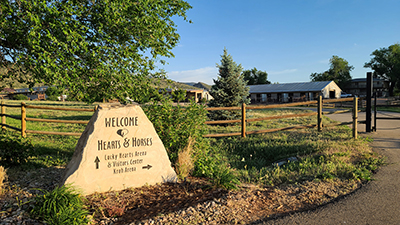
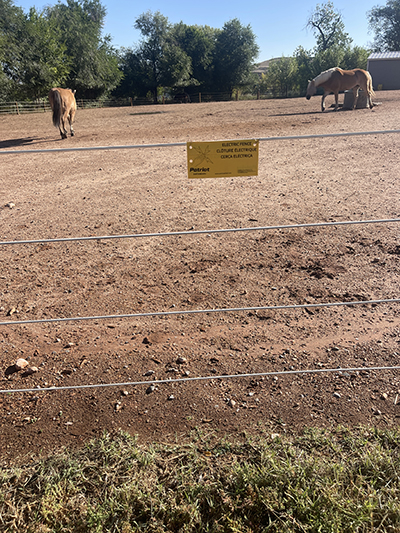
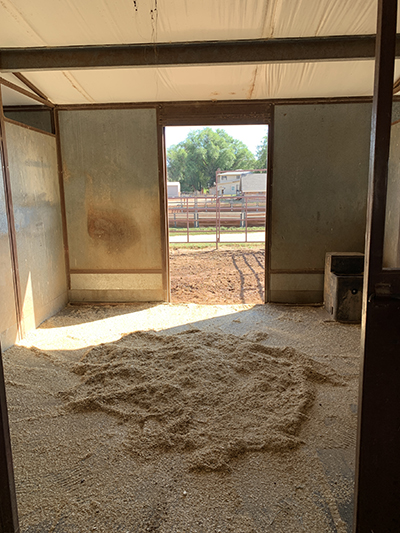
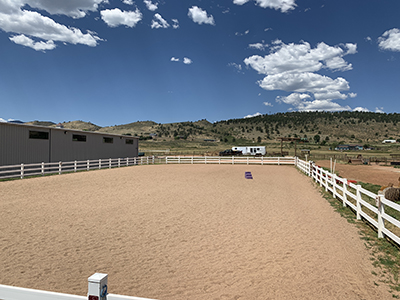
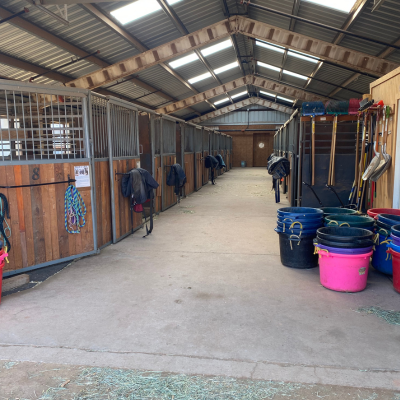
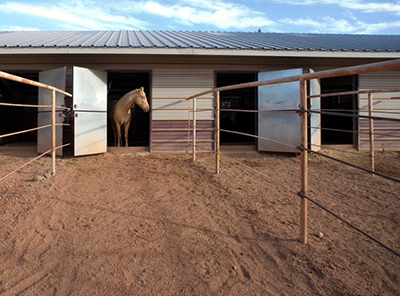
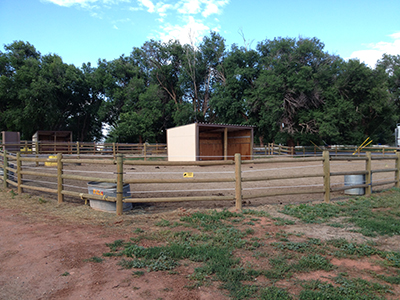
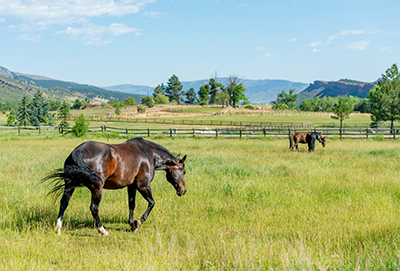
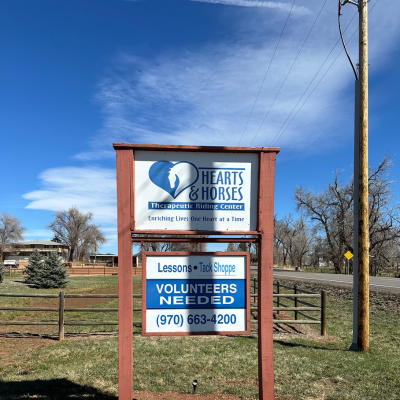
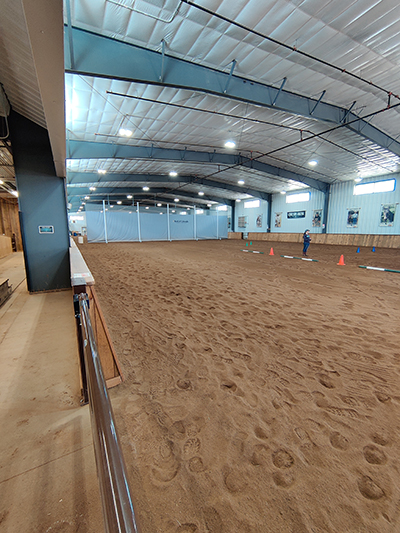
Are the organization's rules, restrictions and warnings (signage) conspicuously posted in easily accessible locations? Yes
Are the organization's emergency contacts, including veterinarian contact information, conspicuously posted in easily accessible locations? Yes
Are human and equine first aid kits easily accessible? Yes
Regarding all shelters where horses are housed including run-in sheds:
Do horses have assigned stalls in the barn/structure(s) or exclusively assigned shelter locations where they are separated from other horses with a barrier? Yes
How many hours per day, on average, are horses stalled or restricted to these sheltered exclusive shelter locations? 13-16
How often are the stalls/shelters cleaned, i.e., kept in good repair and free of standing water, accumulated waste, sharp objects and debris? 6-7 Days a Week
Do all stalls/shelters allow horses to lie down, stand up and turn around and provide protection from inclement weather (wind, sleet, rain, snow and extreme temperatures)? Yes
Are stalls/shelters kept in good repair, with adequate ceiling height, and free of standing water, accumulated waste, sharp objects and debris? Yes
Are floors constructed and maintained for both good drainage and traction? Yes
Is there a ventilation and circulation system in place to allow free flow of air to control temperature, and humidity, and to prevent air stagnation? Yes
Is wiring inaccessible to horses and maintained for safety in all areas of facility? Yes
Are fire prevention/protection measures (fire alarms, extinguishers and sprinkler systems) maintained and in good working order? Yes
Is there adequate lighting to ensure safety in all areas of facility? Yes
How many hours per day, on average, are horses turned out:
Equines are out 4 to 8 hours per day
The following describes the pastures at this facility:
This facility has a written plan in place for pasture management, which includes guidelines for seeding, fertilizing, irrigation, mowing, dragging, harrowing, manure removal, removal of debris, the control of poisonous plants, and a schedule for cleaning
A dedicated staff person(s) is responsible for pasture management
All pastures are fenced to prevent escape or injury
Electric fencing is used; electric wires or tape fence are visibly marked
Fencing checks, such as broken or missing planks, loose fence posts, exposed or loose nails, detached wires, etc., are done regularly
Pastures are rotated
Pastures have natural protection for equines (i.e., trees)
Pastures have man-made protection for equines (i.e., shelters)
This facility does not have pastures where equines can graze on pasture grass
Barbed wire is used for fencing
The following describes the turnout areas other than pastures at this facility:
This facility has a written plan in place for the maintenance of turnout areas, which includes a schedule for cleaning, manure removal, and dragging
A dedicated staff person(s) is responsible for the maintenance of turnout areas
All turnout areas are fenced to prevent escape or injury
Electric fencing is used; electric wires or tape fence are visibly marked
Turnout areas have man-made protection for equines (i.e., shelters)
Fencing checks, such as broken or missing planks, loose fence posts, exposed or loose nails, detached wires, etc., are done regularly
This facility does not have turnout areas
Barbed wire is used for fencing
The following policies and procedures are in place at the facility to restrict public access and to keep horses safe:
The property owner, staff member or caretaker lives on the premises and ensures that public access is restricted and is responsible for the security of the facility and equines
There is a mechanism in place to monitor equines overnight
By Appointment Only signs are posted.
No Trespassing signs are posted
Hold Harmless signs are posted
Authorized Personnel Only signs are posted
Entrance gates are locked at night
Visitors are only permitted at specific times
Visitors are only permitted in specific areas
The property is fitted with motion lights
The property is fitted with a security system that is monitored internally by staff (or the property owner)
The perimeter of the property is fully fenced
A security guard is present at night
The property is fitted with a security system monitored by police or a professional service
Equine Care/Emergency Preparedness: Hearts & Horses, Inc (*Main) 2026 and 2025 This section is required.
Horse Health Care/Barn Management Records: What system is used to collect and store health/horse care records?
Onsite computer with cloud-based backup storage system
Our organization utilizes a software application to maintain records
The following items are consistent with our feed management plan and practices:
Equines are provided with individualized feeding plans, including supplements, according to the equine's age, breed/type, condition, size, work level and any health issues, consisting of nutritious food provided in sufficient quantity and access to adequate natural forage, or be fed daily, or as recommended by the organization's veterinarian
Feed plans are determined in consultation with a veterinarian
Supplement plans are determined in consultation with a veterinarian
Equines are fed grain in individual stalls
Staff and/or volunteers are trained in proper feed measurements and protocols and observed periodically to ensure they are feeding correctly
The feed chart is centrally located and updated as needed
The area(s) where hay, feed, grain, and supplements are stored are kept clean, free of debris and chemicals, and protected from weather and other animals in rodent-proof and mold-proof containers and grain bins
Feed, supplements and hay types are clearly labeled
Water sources, i.e., buckets, troughs, automatic waterers, etc. are kept clean, free of contaminants, debris and chemicals, protected from weather and other animals, and be positioned or affixed to minimize spillage.
Medications are kept in a secure area
Equines are fed grain in groups
Is clean, potable water available at all times for all equines? Yes
Hoof Care: How often is hoof care provided for each equine? Every 4-8 weeks and when an issue arises
Dental Care: How often is dental care provided for each equine? Annually and when an issue arises
Horse checks: How often are equines visually and physically checked by personnel at the facility? Every day or 6 days a week
Our organization has the following parasite and fly/insect control protocols in place, including remedies used to control flies and insects:
Our organization follows the parasite control guidelines of our veterinarian, including fecal testing and de-worming
Fly/Insect Control Remedies:
Fly parasites
Fly Traps and Tapes
Fly Spray Repellent
Fly Masks
Fly Sheets
The following represent the biosecurity practices in place at facility:
Our organization follows the biosecurity guidelines of our veterinarian
Sick, affected and/or quarantined equines do not have contact with other equines or other animals
The organization has a written biosecurity plan
Staff are trained in best practices related to biosecurity
Volunteers are trained in best practices related to biosecurity
A specific individual is trained and assigned to care for sick, affected and/or quarantined equines
Sick, affected and/or quarantined equines are cared for last if the caretaker must also care for healthy equines
Restricted access signs are posted at primary points of access to sick, affected and/or quarantined equines
Hand sanitizers are available at all primary points of access to sick, affected and/or quarantined equines
Footbaths are available at all primary points of access to sick, affected and/or quarantined equines
Manure and bedding from sick, affected and/or quarantined equines is removed from the facility - not put in open air piles, and not spread on pastures
Quarantine areas, such as stalls, aisle ways, paddocks, and common areas, are cleaned (and needed, disinfected) after conclusion of the quarantine.
Trailers/vans used by sick, affected and/or quarantined equines are cleaned and disinfected after each use and cleaning takes place away from where equines are sheltered
Equipment used by sick, affected and/or quarantined equines is not shared
Equipment used by sick, affected and/or quarantined equines is cleaned of organic debris and disinfected after each use
Latex gloves, or equivalent gloves, are worn when working with sick, affected and/or quarantined equines
Equines are not quarantined on arrival.
The following represent the manure removal practices in place at facility:
Manure is stored in dumpster(s)
Manure is piled in an area where equines are not located
Manure is hauled, sold or given away
Our organization adheres to the manure management guidelines set by the state, local authorities, and/or our organization's veterinarian
Manure piles are covered
Manure piles are composted or spread on pastures
The following steps are taken to help staff and volunteers readily identify each horse on the property:
Equines are assigned the same exclusive stall/shelter location each day
Name plates are located on the stall/shelter location
Photos are located on the stall/shelter location
Equines wear halters with nametags
A map/diagram is posted showing the location of each equine with equine names and photos
Equine photos and profiles are available on the website
Staff and volunteers are provided with an information packet with equine profiles, including photos and detailed descriptions
Staff/volunteers are provided training on conformation, markings, colors, and breeds
Team leaders work with new staff/volunteers until they are able to identify the equines
A notebook or binder with photos and information on each equine is easily accessible
Our organization has the following policies and procedures in place pertaining to tack, apparel and equipment:
Saddles are shared
Saddle pads are shared
Blankets, sheets and turn out apparel are fitted and utilized for each equine appropriate to the equine's needs and the weather conditions
Blankets, sheets and turn out apparel are cleaned regularly as needed
Riding Tack is always cleaned at least weekly
Riding Tack is inspected for overall working condition before each use by trained personnel
Riding Tack is assessed for fit before each use by trained personnel
Riding Tack is assessed for fit by trained personnel when an equine's body condition changes
Riding Tack is assessed for fit by trained personnel when an equine's disposition changes
This facility enlists the services of a professional saddle fitter at least once a year
Assigned riding tack is clearly labeled
Riding Tack is stored in a climate-controlled location
Helmets are cleaned/disinfected after each use
Helmets are replaced after a fall
Helmets are replaced at least every five years.
All equines have specifically assigned apparel, equipment and tack (saddles/bridles if ridden) that is not shared
Bridles are shared
Bits are shared
Blankets are shared
Sheets are shared
Turnout apparel is shared
Halters are shared
Riding Tack is always cleaned after each use
Riding Tack is cleaned only when needed
Helmets are shared
No equines are ridden; saddles, bridles, etc. not applicable.
Emergency Preparedness: Hearts & Horses, Inc: *Main This section is required.
The following plans, policies, and procedures are in place at the facility to handle emergencies and address weather related issues, fire safety procedures, and/or any additional hazardous scenarios the facility could potentially experience:
Emergency procedures are posted prominently
The facility maintains at least two weeks of hay, feed, shavings and medications
The facility collects and maintains medical information from staff, volunteers, and clients
The facility maintains appropriate liability and/or workers' compensation insurance
The organization has a written emergency preparedness/safety plan (EPP)
The facility owns or has access to a generator
Local fire department and/or the state's emergency planning department procedures
Medical emergencies for clients, staff, and volunteers
Medical emergencies for equines
Evacuation plans
Power outages
Fire
Natural Disasters - thunderstorm, hurricanes, earthquakes, tornados, etc
Terrorist attacks
Protocols to notify emergency personnel
Building/facility exit plans
The facility follows the specific procedures to help PREVENT emergency situations:
Smoking is strictly prohibited
NO SMOKING signs are posted prominently
Hay is stored away from permanent or temporary structures where equines are stalled
Permanent or temporary structures where equines are stalled are kept free of dust, cobwebs, trash, cleaning rags, and other flammable items
Aisles and doorways are kept clear
Heaters with automatic shutoff settings are used
How often are the following checked or performed?
Fire Extinguishers are checked: Annually
Smoke detectors are checked: Annually
Fence lines are checked: Daily
Turnout Areas are checked: Daily
Sprinkler systems are checked: Annually
Fire drills are conducted: Annually
Review of safety protocols with staff are conducted: Annually
Review of safety protocols with volunteers are conducted: Annually
The Emergency Preparedness Plan is reviewed and updated: Annually
Equine Transportation: 8= Onsite: 2 (2 + 0) + Offsite: 6
2-horse van/trailer with truck:
1 Access offsite;
3-horse van/trailer with truck:
1 Owned onsite 1 Access offsite;
4-horse van/trailer with truck:
1 Access offsite;
6-horse van/trailer with truck:
1 Owned onsite 1 Access offsite;
8-horse van/trailer with truck:
1 Access offsite;
10-horse van/trailer with truck:
1 Access offsite;